
Nominees for the 2022 Freedom of Expression Awards – Campaigning
 Venezuela Inteligente (VE inteligente) is a non-profit organisation which works to empower civil society and media organisations in Venezuela. They fight for freedom of expression and civic engagement online and offline.
Venezuela Inteligente (VE inteligente) is a non-profit organisation which works to empower civil society and media organisations in Venezuela. They fight for freedom of expression and civic engagement online and offline.
The situation for democratic institutions in Venezuela has deteriorated dramatically in the last few years with harsh crackdowns on independent media and political dissent. In response, activist Andres Azpurua established VE Inteligente to investigate and monitor internet censorship in Venezuela. VE Inteligente seeks to increase civic engagement and access to reliable information. They monitor media freedoms online and provide individuals and civil organisations with the tools needed to navigate online spaces safely. VE Inteligente has provided reports on internet censorship and other online threats in Venezuela to UN bodies and has collaborated with election observation missions to the country.
Through various workstreams, VE Inteligente aims to protect civic rights and freedom of expression online. Their watchdog project VE sin filtro (Venezuela without a filter) monitors online censorship and surveillance and their campaign ‘Como Votar?’ (How to vote) offers step-by-step instructions on voting processes and voters rights. VE Inteligente also creates tools, tutorials, and training on how to avoid censorship and how to communicate securely online.
VE Inteligente have recorded that the media landscape in Venezuela is increasingly restrictive. 40 news websites are currently blocked in Venezuela and misinformation is prevalent. VE Inteligente hopes to mitigate the restrictions and help encourage free expression and media freedom in Venezuela.
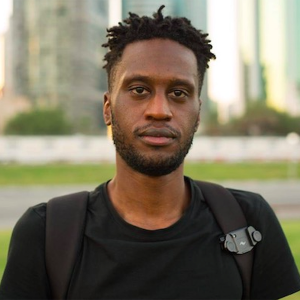 Malcolm Bidali is a labour rights defender and blogger from Kenya. In 2021, Bidali was arrested after writing about the realities of being an immigrant worker in Qatar.
Malcolm Bidali is a labour rights defender and blogger from Kenya. In 2021, Bidali was arrested after writing about the realities of being an immigrant worker in Qatar.
Malcolm was working as a security guard in Qatar and grew frustrated with poor living and working conditions. In order to speak out about the situation, Malcolm reached out to Migrant-Rights.org and began writing for them about his experiences under the pen-name Noah. He also began his own blog and social media accounts with the handle ‘Noah articulates’. He wanted to document and expose the exploitation and human rights violations migrant workers are subjected to in Qatar.
Malcolm was writing anonymously, and he had to be very careful about revealing information about his online activity to friends, family, or colleagues. In March 2021 he posted a blog post discussing Her Highness Sheikha Moza bint Nasser’s complicity in the mistreatment of migrant workers working on a particular project that she frequented. Soon after, he was detained. Malcolm was denied access to a lawyer and spent 28 days in solitary confinement. He was finally released after three months in detention. He was forced to pay a fine and asked to leave Qatar. He fears that he will be detained again if he ever returns to Qatar.
After being released, Malcolm returned to Kenya where he continues to advocate for migrant rights. He has worked with Amnesty Kenya as a trainee and consultant and he hopes to set up an NGO run by and for former migrant workers in the Gulf countries
Malcolm compares activism to an extreme sport – there are risks involved, but it gives him purpose. He feels compelled to speak up on behalf of those who are silenced.
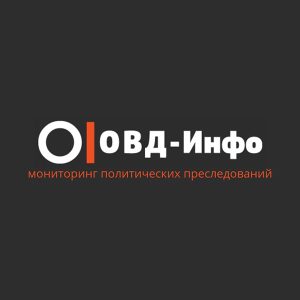 OVD-Info is an independent human rights media project documenting political persecution in Russia. With the help of a hotline, they collect information about detentions at public rallies and other cases of political pressure, publish news and coordinate legal assistance to detainees.
OVD-Info is an independent human rights media project documenting political persecution in Russia. With the help of a hotline, they collect information about detentions at public rallies and other cases of political pressure, publish news and coordinate legal assistance to detainees.
The organisation was set up in 2011 to document arrests during the widespread anti-fraud protests. Initially, groups of journalists and specialists collected and published information about the arrests on social media. As the organisation grew and became more structured they eventually set up a website. The organisation has now evolved to offer legal guidance and support to people arrested at peaceful protests in Russia.
Over the last year, censorship has increased in Russia with many media sites blocked. In September 2021, OVD-Info was labelled as a ‘foreign agent’ by Russian authorities. This means that the organisation must add a disclaimer to any work they publish: “THIS NEWS MEDIA/MATERIAL WAS CREATED AND/OR DISSEMINATED BY A FOREIGN MASS MEDIA PERFORMING THE FUNCTIONS OF A FOREIGN AGENT AND/OR A RUSSIAN LEGAL ENTITY PERFORMING THE FUNCTIONS OF A FOREIGN AGENT.” Their website was later blocked by Russian authorities because they claimed that news about detained people glorified terrorism and extremism.
During the ongoing war in Ukraine and associated anti-war protests in Russia, OVD-Info’s work is more important than ever. Within the first 10 days of the war, OVD-Info registered more than 13,000 arrests at anti-war protests in Russia. In March 2022, Marina Ovsyannikova interrupted the Russian state Channel One while holding a sign saying “Stop the war. No to war.” Following her on-screen protest, OVD-Info released a pre-recorded video by Ovsyannikova where she explained her motivations.
Despite a highly unpredictable situation and persistent censorship, OVD-Info continue to support detained and persecuted protesters in Russia.
Nominees for the 2022 Freedom of Expression Awards – Arts
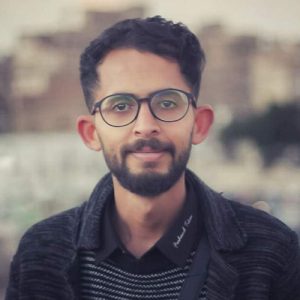 Yemeni artist Thiyazen Al-Alawi uses his craft to shed light on the destructive situation in Yemen through street art campaigns. He hopes to inform the public of what the war has done to his homeland.
Yemeni artist Thiyazen Al-Alawi uses his craft to shed light on the destructive situation in Yemen through street art campaigns. He hopes to inform the public of what the war has done to his homeland.
First inspired by the Arab Spring in 2011 as a teenager, Thiyazen turned to art as a form of self expression, launching his first street art campaign in 2012 as the war began. As conflict invaded every aspect of Yemeni life, he decided “every artwork is proof of their existence and continuity in life…something that gives people hope.” Thiyazen’s work aims to reflect the ugliest and truest forms of war, and its effect on real people.
Thiyazen’s latest project is a collaboration with British artist Luc Waring titled “Letters from Yemen”, a series of drawings and letters from conversations between the two about art, peace, war, and the horrors Thiyazen has witnessed himself. Inspired by a saying Thiyazen heard in his youth, the walls must do the talking when the newspapers are silent; the compiled writings and portraits raise awareness about the war in Yemen with a sensitivity and humanity only an artist and their medium can produce, eventually gaining traction and attention by the public. Due to the ongoing occupation by the Houthi militia, Thiyazen is risking his own safety as he continues to produce art.
Thiyazen continues his work on long-term projects with the Swiss Arts Council to spread awareness about the conditions in Yemen. He also contributes to the “Yemen Peace Forum” with the Sana’a Center for Strategic Studies, writing articles and studies like “Art and Youth in Yemen” in the Journal of Transitional Justice of the University of Oxford. “I feel that I must tell the truth no matter what,” Thiyazen explains,” I could sacrifice my life for the truth. And nothing will stop me.”
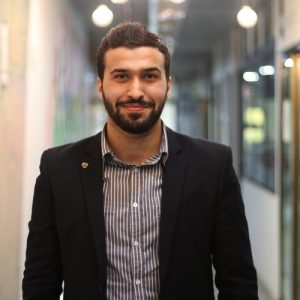 Moe Moussa is a journalist, podcaster, poet, and the founder of the Gaza Poet Society. He uses various forums and mediums to amplify the voices of Palestinians.
Moe Moussa is a journalist, podcaster, poet, and the founder of the Gaza Poet Society. He uses various forums and mediums to amplify the voices of Palestinians.
Moe began his career as a translator for international journalists in 2014. He was soon inspired to speak about the situation from his own perspective. Studying English literature in college and growing up around poetry, it was only fitting that Moe decided to use his art to bring the individual lives of people in Gaza to the international audience.
Delving into Palestinian poetry led Moe to connect online with poets all over the world. He was interested in using his skills as a poet and a journalist to share the stories of individual lives with a global audience. After realising the lack of opportunities for poets to share their work in Arabic and English, he created a space to offer an opportunity for young people to speak and find their own voice in 2018 – the Gaza Poet Society. The organisation is supported solely by donations from international poets who believe in Moe’s cause. He is at constant risk of Hamas censorship and at the will of the Gazan government to approve of civilian movement out of the country.
Watching his family go days without water, power, and freedom of movement, Moe temporarily left Gaza for Istanbul in 2021 to continue his work more effectively. He was awarded the Times Richard Beeston Bursary in 2019 and has plans to complete his fellowship in London in 2022 following delays due to the pandemic. As the creator and host of the podcast “Gaza Guy”, he is focused on amplifying the voices of young Palestinians through poetry and fights for access to education in Gaza. Additionally, Moe has contributed to We Are Not Numbers, a site publishing stories of Palestiniain youth experiencing war. Moe recently released his debut poetry collection titled “Flamingo” and is working freelance to support the Gaza Poet Society from abroad.
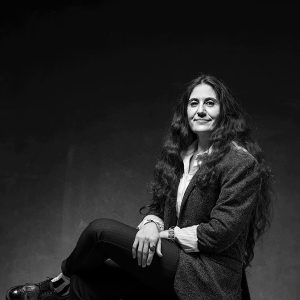 Fatoş İrwen is a Kurdish artist and teacher from Diyarbakır, Turkey working with a variety of materials and techniques.
Fatoş İrwen is a Kurdish artist and teacher from Diyarbakır, Turkey working with a variety of materials and techniques.
İrwen regularly uses her art to document her experiences as a Kurdish woman living in Turkey. The performance piece Füg [Fugue, 2012] documented her first experiences in police custody where she was physically and sexually abused. In 2016 İrwen was again taken into custody while boarding a domestic flight. She was charged with “resisting the police, opposition to the law against demonstrations and assemblies, propaganda for a terrorist organisation, belonging to a terrorist organisation” and sentenced to 3 years, 1 month and 15 days in prison. The charges related to a peaceful protest in 2013.
During her imprisonment, İrwen made 1,500 works of art using materials accessible to her, including hair, tea, food, shoe polish, old textbooks and newspapers, bed sheets, laundry pegs, scarves, and mould and cigarette ashes. Among other projects, the 2019 piece titled “Gülleler” (Cannonballs) features balls crafted from the hair of inmates participating in a hunger strike. “The hunger strike was like firing a shot to the outside world,” İrwen says. After being released, İrwen collected her art pieces in her first solo exhibition titled Exceptional times which was featured at Depo in Istanbul in 2021.
Discussing censorship by the Turkish authorities, İrwen says “this issue still continues to be the most painful issue of our lives and for which we pay a heavy price.” She is deeply committed to fighting for freedom of expression and artistic freedom.
Due to her challenges with Turkish authorities and her identity as a Kurdish woman, İrwen has found that galleries and art spaces are sometimes reluctant to feature her work. Still, she has found success, and her work has been exhibited in Iran, Germany, Austria, Hong Kong, Iceland, France, Mexico, Iran, Morocco, Sweden, and Turkey.
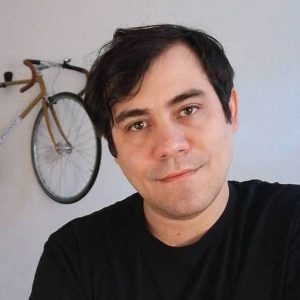 Hamlet Lavastida has been described as a political activist by way of art. Lavastida uses his art to document human rights abuses in Cuba and to criticise Cuban authorities.
Hamlet Lavastida has been described as a political activist by way of art. Lavastida uses his art to document human rights abuses in Cuba and to criticise Cuban authorities.
Lavastida pushes boundaries of censorship in Cuba and highlights the distinctly Cuban spirit of cultural resistance. His work reconstructs old Cuban political and military propaganda.
Throughout his career, Lavastida has sought to use his art to fight for transparency and freedom of speech in order to fight against the Cuban government. He sees his art as a non-violent tool to fight against the current regime. Lavastida has been involved in various protest movements in Cuba, including the 27N movement which grew out of the protests held on 27 November 2020. The movement works to bring attention to the censorship of artistic expressions in Cuba.
In June 2021, Lavastida was arrested after returning from a residency at the Künstlerhaus Bethanien in Berlin. He was accused of ‘incitement to commit a crime’ because he suggested that other artists stamp images related to the San Isidro and 27N movements on local currency. Following his arrest, Amnesty International named him as a ‘prisoner of conscience’. Lavastida stayed in prison for 87 days. He was finally released without charges.
Lavastida has been living in exile in Europe since September 2021. He has been warned that he will be arrested immediately if he ever tries to return to Cuba. Lavastida is deeply concerned by the situation. While has experienced threats and censorship targeting his art throughout his career, he is now experiencing threats against him as an individual. He believes this is part of a greater trend of censorship in Cuba.
Lavastida plans to continue creating art and speaking up about the situation in Cuba.
Another deadly year for journalists
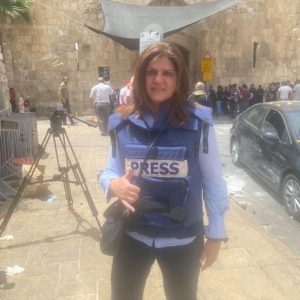
Al Jazeera journalist Shireen Abu Akleh
This week I was planning to write about the Queen’s speech, delivered this week by HRH Prince Charles, as the British Parliament began its new parliamentary session and the Government outlined it parliamentary priorities. There are now six proposed pieces of legislation by the British Government that will impact our collective rights to both freedom of expression and privacy in the United Kingdom. But my views on the ideological incoherence of the Government’s approach to freedom of expression will have to wait until next week.
Because today we mourn the death of another journalist. On Wednesday, Shireen Abu Akleh, a well-known and well regarded Palestinian-American journalist was killed while doing her job in Jenin.
According to Committee for the Protection of Journalists (CPJ) Shireen is the 17th journalist to have been killed in the line of duty in 2022. Index has fought to defend the rights of journalists for over fifty years. Every attack on a journalist is an effort to stop people speaking truth to power. It’s an attempt to quash dissent and to impose a single world view. And every death seeks to silence not just the voice of journalists but through them the voices of all of us. We cannot allow those who seek to repress their populations to win.
Today our thoughts and prayers are with Shireen’s family and loved ones. And as much as we mourn her today, we remember and honour the work and sacrifices made by her, her family and the sixteen other journalists who have lost their lives in 2022.
6 January – John Wesley Amady, Haiti
6 January – Wilguens Louis-Saint, Haiti
9 January – Pu Tuidim, Myanmar
17 January – Alfonso Margarito Martinez Esquivel, Mexico
5 February – Rohit Biswal, India
9 February – Evariste Djailoramdji, Chad
10 February – Heber Lopez Vasquez, Mexico
23 February – Maximilien Lazard, Haiti
1 March – Yevhenii Sakun, Ukraine
13 March – Brent Renaud, Ukraine
13 March-1 April – Maks Levin, Ukraine
14 March – Oleksandra Kuvshynova, Ukraine
14 March – Pierre Zakrzewski, Ukraine
15 March – Armando Linares Lopez, Mexico
23 March – Oksana Baulina, Ukraine
Late March – 2 April – Mantas Kvedaravicius, Ukraine
11 May – Shireen Abu Akleh, Occupied Palestinian Territory
Each of these brave journalists needs to be remembered and celebrated for their work and their sacrifice. And their families need and deserve both the truth and, most importantly, justice.
Index on Censorship and Reporters Without Borders welcome High Court’s decision in Realtid case
Reporters without Borders and Index on Censorship welcome the High Court’s decision to throw out large parts of the libel case against the Swedish business and finance publication Realtid, its editor-in-chief, and two of its investigative journalists.
The High Court’s decision comes fifteen months after a jurisdiction hearing aimed at deciding whether England and Wales is the appropriate jurisdiction for the defamation case to be heard. On 11 May 2022, the judge ruled that the courts of England and Wales do not have jurisdiction over ten of the thirteen defamation claims. One of the claimants, Eco Energy World (EEW) has been precluded from bringing its claim over five different articles on the basis that it has not shown it suffered serious financial loss stemming from Realtid’s publications. The second claimant, EEW’s founder Svante Kumlin, may proceed with the case as an individual on only three of the eight articles he sued over, but these actions have been restricted to claiming for any harm he suffered in England and Wales.
Jessica Ní Mhainín, policy and campaigns manager for Index on Censorship, said: “While we welcome the High Court’s decision, we remain concerned that Realtid may nonetheless have to continue defending themselves in London’s courts. This case one again underlines the urgent need for the UK to adopt anti-SLAPP legislation, particularly a filter mechanism capable of rooting out SLAPPs at the earliest possible stage of proceedings”.
Erik Halkjaer, president of Reporters Without Borders Sweden said: “The fact that Swedish reporters in Sweden, which currently ranks third out of 180 countries on the RSF World Press Freedom Index, with its own set of solid media laws and regulations concerning publications, needs to take into account that they can be sued in another countries courts is a threat not only against the journalists, but the Swedish media laws. The Swedish government should find ways of blocking these kinds of SLAPP cases against Swedish journalists”.
Realtid’s editor-in-chief Camilla Jonsson said: “We are glad that the court listened to our arguments about the company’s claims being unfounded and therefore not suited for a trial in London. We also note that five of the eight articles in the case have been ruled as not being libelous even before we have filed our full defence on this. However we feel it is problematic that a Swedish magazine and Swedish journalists still might have to continue defending ourselves in a British court. But we are confident that our reporting will prove to be factually substantiated and in the public interest which in the end will lead to a successful outcome of the case”.
For press inquiries contact:
Erik Halkjaer, [email protected]
Jessica Ní Mhainín, [email protected]
Index raises concerns over exclusion of journalists from UK Home Secretary’s Rwanda visit
Index has filed a Council of Europe alert raising concerns about the decision to exclude certain journalists from accompanying UK Home Secretary Priti Patel on an official visit to Rwanda where she announced a proposed new arrangement for sending British migrants to the central African country to have their asylum claims decided.
Journalists from The Guardian, Financial Times and The Mirror were among those excluded by the Home Office on the mid-April press trip, restricting their ability to scrutinise a significant development in British foreign policy.
Among those excluded was Rajeev Syal, the Guardian’s home affairs editor, who had previously reported extensively on bullying allegations against Patel. Other home affairs specialists did accompany Patel on the trip. The Guardian said: “We are concerned that Home Office officials are deliberately excluding specific journalists from key briefings and engagements.”
The Financial Times told Press Gazette: “On this occasion our journalists were excluded from the press trip and received minimal briefing. It is clearly not good practice to exclude some media from government meetings simply because they are willing to ask difficult questions.”
Index understands it is not the first time journalists have been blacklisted by the Home Office in this way. Only a select group of reporters was invited on a trip Priti Patel made in November 2021 to Washington DC to discuss terrorism and the global migration crisis with Alejandro Mayorkas, US secretary of homeland security.
The government’s controversial scheme will see migrants who arrive in small boats after crossing the English Channel flown 4,000 miles to Rwanda to have their claims processed; in her speech in Rwanda, Patel said 28,000 migrants crossed the Channel this way in 2021.
Migrants will be encouraged to relocate to the African country. Patel said, “Those who are resettled will be given support, including up to five years of training to help with integration, accommodation, and healthcare, so that they can resettle and thrive.”
Opponents of the scheme have questioned Rwanda’s record on human rights and free expression. Journalists working in Rwanda operate under a strict accreditation system and criticism of President Paul Kagame is off limits.
In March, Human Rights Watch said Rwanda did not match up to international standards of free speech and warned of a wave of arrests of Rwandan journalists and commentators: “Judicial authorities in Rwanda, lacking the independence to stand up and protect free speech in accordance with international law, have unjustly convicted and jailed people based on their protected speech and opinions,” said Lewis Mudge, Central Africa director at Human Rights Watch.
The first legal challenge to the Rwanda scheme was launched last week on behalf of an Iranian asylum seeker. Lawyers argue the proposals breach international law, the UN refugee convention and British data protection legislation.
In her speech in Rwanda, Patel said, “This agreement fully complies with all international and national law, and as part of this ground-breaking agreement, the UK is making a substantial investment in the economic development of Rwanda.”
The Home Office has denied targeting certain journalists and says it adheres the UK’s Government Communication Service Propriety Guidance in dealing with the media.
The Council of Europe was founded after World War II to protect human rights, democracy and the rule of rule across the continent. It is committed to upholding the European Convention on Human Rights.
The British government will be asked to provide a formal response to the alert, although it has a poor record in this regard, responding to just 10 per cent of the alerts filed in 2021.
Syria passes draconian cybercrime laws
Syria has become the latest country to implement new far-reaching cybercrime legislation that goes beyond what is necessary to keep the internet safe.
On 18 April, Syrian president Bashir al-Assad announced new laws that could result in harsh penalties criticising or otherwise embarrassing the Syrian government.
Anyone breaking the law can be jailed for up to 15 years and face penalties up to S£15 million (£23,000).
The highest fines and sentences are reserved for “crimes against the Constitution” and for undermining the prestige of the State including websites or content “aiming or calling for changing the constitution by illegal means, or excluding part of the Syrian land from the sovereignty of the state, or provoking armed rebellion against the existing authorities under the constitution or preventing them from exercising their functions derived from the constitution, or overthrowing or changing the system of government in the state”.
Publishing what the new law describes as “fake news…that undermines the prestige of the state or prejudices national unity” can lead to five-year jail sentences and S£10 million (£15,300) fines which seems to target bloggers and digital activists who publish criticism of the government online.
In a statement the Gulf Centre for Human Rights (GCHR) said the law could be used to violate many of the basic digital rights of citizens, especially freedom of expression and freedom of digital privacy.
It said, “GCHR believes that the law should be reviewed and its definitions defined more clearly to ensure the existence of a strong and practical law that does not violate the basic rights of citizens, but rather contributes to creating a free and accessible internet in which diverse opinions are respected and human rights are protected and promoted.”
The new law also obliges internet service providers to save internet data for all users for a period of time to be determined by the competent authorities.
The GCHR calls this “a flagrant violation of the digital privacy of citizens and provides ease of access by security services to all information related to peaceful online activists”.
The Syrian cybercrime law is just the latest in a growing body of legislation around the world ostensibly used to target cybercrime but clearly intended to stifle legitimate criticism and restrict freedom of expression.
According to the United Nations Conference on Trade and Development, 81% of countries have now implemented cybercrime legislation with a further 7% with draft legislation.
Many argue that cybercrime legislation makes the internet a safer place but many countries with human rights are under attack, including Brazil, Myanmar and the UAE, are using such legislation to silence critics.
In January, the United Arab Emirates adopted new legislation that promised fines of up to AED100,000 and jail terms of up to a year for “anyone who uses the internet to publish, circulate or spread false news, rumours or misleading information, contrary to the news published by official sources”. These penalties are doubled when publication happens “during times of pandemic, crises or disasters”
Attempts to introduce such draconian legislation are being resisted by human rights and journalism associations.
In February this year, the Pakistani government passed an ordinance amending the Pakistan Electronic Crimes Act, 2016. Of particular concern was an expansion of the “offences against dignity” section of the legislation to cover the publication of “false” information about organisations, companies and institutions, including the government and military.
However, in April, the Islamabad High Court, following challenges by the Pakistan Federal Union of Journalists and the Pakistan Broadcasters Association, threw out the ordinance. The court noted: “Freedom of expression is a fundamental right and it reinforces all other rights guaranteed under the Constitution … [and] free speech protected under Article 19 and the right to receive information under Article 19-A of the Constitution are essential for development, progress and prosperity of a society and suppression thereof is unconstitutional and contrary to the democratic values.”
Democracies are losing their moral authority to intervene
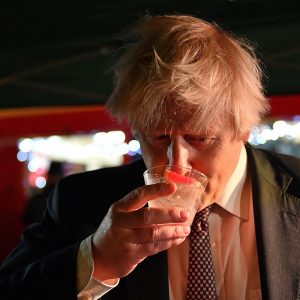
Prime Minister Boris Johnson samples an Isle of Harris gin. Photo: Justin Tallis/PA Wire/PA Images
This week was election week in the UK and, as a former parliamentarian, you’d expect me to be writing about the joy of being able to express ourselves at the ballot box and the vital importance of democratic values when they seem so under attack at the moment in too many places to mention.
I love elections, I love the debate, I love speaking to people on their doorsteps and there is nothing like a successful election count for your party. I cherish the fact that I am lucky enough to live in a democracy, that typically my human rights are protected because my fellow citizens also believe that democracy is something to be protected. But voting is a means to an end – it allows us all to hold our politicians to account and to ensure that our core values are reflected in our government. This only works if you believe that your democratically elected government is going to stick to the rules and it’s that that I have been reflecting on for the last couple of weeks.
There are some conversations that keep coming back to you. That spark debate and lead you to question the status quo. Last month, I had a series of meetings where there was a recurring theme that did just that.
International norms and the rule of law, which underpin both our democratic states and our world order, are only relevant if state actors recognise them and that culturally we all acknowledge their necessity.
The moral authority of democratic countries is dependent on how they choose to apply the rule of law – both domestically and internationally. On whether they are prepared to defend core democratic values, even when inconvenient, on a national and international stage. It’s the application of these norms and rules which empower democratic states to challenge others when they break them. And the recurring message from my meetings was that there was no longer an acceptance that democratic states were prepared to uphold the rule of law – if it didn’t suit them. And therefore, we are losing our moral authority to intervene when others break the law.
Poland is being fined one million euros a day by the European Court of Justice for undermining its domestic judiciary. Rather than comply with the ruling, Poland has been happy to let the fine mount up – a proportion of its EU finding withheld to pay for it.
The European Commission is also cutting funding to Hungary for eroding legal standards in the EU.
The British Prime Minister has been fined for breaching his own Covid-19 regulations and, pre-pandemic, was found to have unlawfully suspended Parliament.
In the US we saw incitement by leading politicians to undermine a smooth transition of power after the last presidential election.
This would be dangerous at any time, but right now when Russia and China are both attempting to leverage their power and influence, invade and threaten their neighbours we have never needed to uphold our international norms more.
The leaders of our democratic nation states speak with a level of moral authority on a global stage because their voice is our voice, because they are seen to uphold our core values – and they can therefore challenge other world leaders when they cross the line. If our current global order is to survive it’s therefore imperative that our leaders uphold the law – whether it suits them or not.
The rule of law is the basis of the campaigns that Index runs. Our work is framed by Article 10 of the European Convention on Human Rights – that everyone has the right to freedom of expression. We demand that national states uphold the values espoused by the Universal Declaration of Human Rights. If our leaders aren’t upholding these values, then it’s not just their voices that are weakened but ours too.
My fear is that when international norms aren’t followed – when our leaders opt in and opt out of laws and norms they don’t like – then repressive regimes thrive and their citizens are the ones that suffer.
So, this is really a plea to all of us who are lucky enough to live in democratic societies – hold your leaders to account and make sure that they comply with the law – so that we all have the moral authority to hold the tyrants’ feet to the fire.
“I believe in a new Russia but Putin is going nowhere”
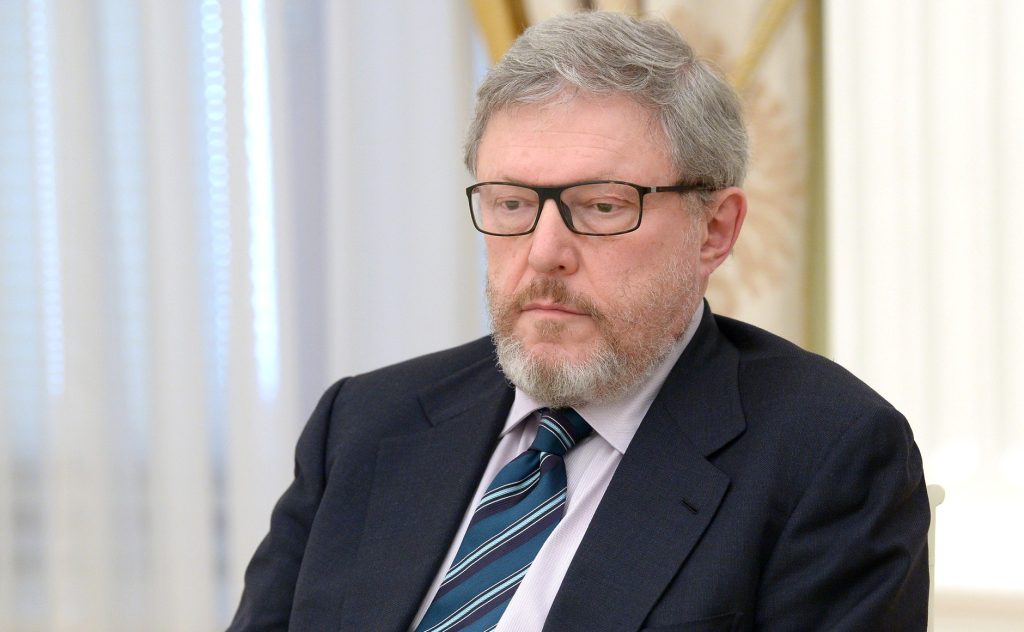
Russian politician, academic and economist Grigory Yavlinsky, who became known with his plan for a smooth transition from the Soviet regime to a free-market economy. Credit: Пресс-служба Президента Российской Федерации/Wikimedia Commons
Russian liberal politician, economist and professor Grigory Yavlinsky has long been a thorn in the side of Vladimir Putin. As the founder of the Russian United Democratic Party (Yabloko), which was the leading opposition party in post-Soviet Russia, Yavlinsky has campaigned against Putin on several occasions. In 2000 Yavlinsky participated in the Russian presidential elections under the slogan “For Russia without Dictators and Oligarchs.” In 2018, he ran in the presidential elections on an anti-corruption platform.
I first spoke to Yavlinsky in February 2012. In an interview for New Eastern Europe Yavlinsky told me he was preparing, once again, to offer Russian voters an alternative to Putin’s dictatorial reign in the Kremlin. Back then, Yavlinsky remained hopeful. “A non-democratic and corrupt system which has been created by Putin and Yeltsin, requires cardinal changes, and absolutely different politics in Russia today and important events will take place to see this happens in 2012,” Yavlinsky explained. “To change this system we need a political, economic, and moral alternative which would be supported by the people,” he added.
Today, these hopes have vanished. Why, then, do the Russian people still overwhelmingly support Moscow’s war of aggression against Ukraine? I caught up with Yavlinsky and this was the main subject I broached.
Ukraine is a subject that Yavlinsky is familiar with. He was, after all, born there, when it was part of the Soviet Union. Also, in 2018, when Yavlinsky ran in the presidential elections in Russia, he devised a plan to resolve the ongoing Russian-Ukrainian military conflict, which began in 2014.
My own interest in Ukraine is personal too. I was living in Lviv for two years. But I left the western Ukrainian city on 24 February 2022, the day of the Russian invasion.
The conversation below considers the war, as well as broader free expression battles happening in Russia right now.
Mr Yavlinsky, you were born in Lviv in 1952. Do you consider yourself Ukrainian?
I do not consider myself a Ukrainian, but I grew up in Ukraine, and studied at a Ukrainian school. I love the language and respect the culture. But regardless of where I am from, I consider the current events in Ukraine as a gigantic tragedy.
Recent surveys have indicated that an overwhelming majority of people inside Russia support this war of aggression against Ukraine. Clearly, then, it’s not just Putin’s war. Why do so many Russians support the conflict?
A lot of people [in Russia] seem to support what is happening [in Ukraine] for three reasons.
Firstly, propaganda in Russia has unfolded with great force.
Secondly, fear. Today in Russia, the fear of police and judicial harassment is huge. Finally, in Russia in the 1990s, an economic and political system was created that categorically excluded most people. It convinced the majority that they had no means of influencing what was happening in public life or the political sphere.
There also seems to be a sense that inside Russia people do not have access to their own history. Presumably this is an important weapon in Putin’s propaganda machine?
In Russia in the 1990s, the moment was missed when an honest assessment of Bolshevism, Stalin and the Soviet period should have been given. It was a huge failure in reforms, and we are now reaping the fruits of this tragic mistake. In general, people in Russia know their history very poorly.
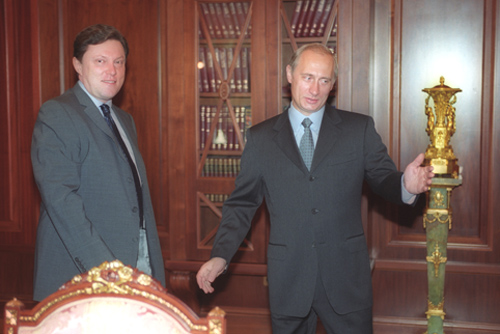
Grigory Yavlinsky pictured with Vladimir Putin in 2000, when Yavlinsky ran for Russia’s presidency. Credit: Presidential Press and Information Office/Wikimedia Commons
Is an internal coup to bring down the Putin regime possible? Or is there simply too much fear in the Russian political system?
Today I don’t see any chance of anything like a coup against Putin. He has significant support among citizens. The scale of the opposition is completely insufficient to seriously influence the change of the state system. The reason for what is happening isn’t just about Putin – the entire Russian state and economic system has led to this.
How will western imposed sanctions against Russia affect the outcome of this war in the long term? Some critics claim, for instance, that the sanctions do not go far enough. Others have pointed out that a state that descends into poverty and chaos actually strengthens an authoritarian ruler like Putin.
The sanctions in their current form will create significant difficulties for the Russian economy, but they will not lead it to collapse. The decline in living standards will affect the middle class most of all. However, state propaganda will [blame it on] external and internal enemies. On this basis, a left-nationalist policy, national socialism can be formed. Putin will try to lead this direction. He has already talked about it. Under these conditions of a dictatorship and a police state, this will be a dangerous and difficult period.
Is Putin capable of using nuclear weapons?
Yes, I think Putin may use nuclear weapons, and this should be taken seriously.
Under what circumstances could the West become involved in a military conflict with Russia?
This is a question for politicians in the West. This may be due to provocation, or to the supply of heavy weapons. As with the use of nuclear weapons, such a danger exists.
Is there any evidence to suggest that Putin could lose his grip on power if Russia continues to suffer more military defeats in its war against Ukraine?
No matter how the military situation in Ukraine develops, there are no circumstances that can lead Putin to lose control of power in the foreseeable future.
But with more and more Russian soldiers dying, could a situation arise where Putin, under political pressure, looks for a potential compromise to end the war?
A cessation of hostilities is possible. But it will only be a temporary stop. Russia wants to build a separate civilisation and considers Ukraine a part of it. Ukraine, conversely, wants to become a European country, and considers itself an independent state. In these circumstances, any truce will be temporary.
Are you surprised at how well Ukraine has responded to this conflict?
No. I’m not surprised. [Since 2014] the armed forces in Ukraine have changed. There was a patriotic unity of the people, which became the basis of real resistance. The Kremlin expected that in the east of Ukraine [after the so called “special military operation” was launched on February 24 of this year] it would be greeted with flowers by joyful crowds of people. It turned out to be an illusion. Also, the Russian leadership did not expect such unity on the part of Western countries.
Ukraine seems to be winning the public relations war too. Why is that?
This is the gap of the post-Soviet space: Russia aspires to the 19th century, and Ukraine – to the 21st. This, [in essence] is the whole conflict. All the attention and understanding of the Russian leadership is turned back: to the Second World War, to the Soviet period, to the Russian Empire. Hence, ideological cliches about a separate civilisation. Ukraine found itself in a completely different situation. Ukraine wants to change the president regularly and have independent justice, independent private property, and be a European country.
Putin continually insisted leading up to the war that Russia would not invade Ukraine. Most western and Ukrainian politicians now believe he cannot be trusted in any diplomacy going forward. Will the Putin regime have to fall before this war ends?
Putin has talked about [his plans for Ukraine] before: in 2012, in 2014 and in 2018 during the presidential elections. He announced his programme in full in July 2021 in an article entitled “On the historical unity of Russians and Ukrainians”. No one wanted to take Putin’s published doctrine seriously, either in the West, or inside [Russia]. We must understand that for a long time we will have to deal with this particular regime.
You have mentioned many times publicly that Russia is a European country. What exactly do you mean by this?
Of course, Russia is a European country. By its culture, by its mentality, by its history. The only positive prospect for Russia is the European one. Attempts to send Russia somewhere else, to make a separate civilisation out of it, are fraught with disaster and loss of the future. Right now, we are on the verge of this catastrophe. The current leadership of Russia does not understand this. It does not want a permanent, regular change of power. It does not want real elections, or an independent judicial system. And it does not want a rule-of-law state in Russia, or to have a real middle class. Because a real middle class would pose a threat to [the current Russian state]. [Which is built] on lies, propaganda, violence and a police state. That is why Putin and his entourage want to take Russia out of the European context. There is simply no alternative to Russia’s European path.
Why did corruption and kleptocracy beat transparency and the rule of law during the early years of the Russian Federation?
There was gross mistakes and crimes in the reforms. Hyperinflation in 1992 was 2600%. This led to criminal privatisation – [public] property was then transferred free of charge to persons close to the authorities. Consequently, there was a merger of property and power in Russia. A corporate mafia state was [thus] created. There cannot be an independent justice, an independent press, an independent parliament, or a state governed by the rule of law [in Russia], because all these institutions threaten the results of this criminal privatisation. This system demanded a leader like Vladimir Putin. The West turned a blind eye to all of this.
Putin’s reckless lawbreaking over the last two decades has included numerous illegal overseas assassinations . Then there is murder of domestic critics, which includes many journalists. And the jailing of numerous opposition political figures, like Alexei Navalny (still in prison) and Mikhail Khodorkovsky (who spent a decade behind bars). Has your own life ever been threatened by the Putin regime?
It is a well-known fact that it’s really dangerous to engage in politics in Russia. The biggest political crime, of course, is the murder in 2015 of Boris Nemtsov, 100 metres from the Kremlin. As for personal threats, it is completely pointless to discuss them. For the last 25 years, they have been a constant factor for [any]opposition politician inside Russia.
In 2018 you participated in the presidential elections in Russia. You presented a plan in your campaign to resolve the ongoing Russian-Ukrainian military conflict, which began in 2014. Can you discuss what that plan involved?
I participated in the presidential elections in 2018, because it was clear that this was the last election in which it was still possible to influence something. I proposed to resolve the situation in the east of Ukraine, in the Donbass, in particular, by taking the following steps.
- To propose to the countries of the Normandy Four and the United States a form of international guardianship over the “territories of Donetsk and Luhansk regions with a special order of local self-government” on the basis of the institute of international guardianship provided for by Chapter 12 of the UN Charter, using the experience of the 1995 Dayton Accords and the 1954 Saarland Status Agreements.
- To conclude a special multilateral (Ukraine, Russia, Germany, France, the USA and the EU) agreement on the temporary status of the “territories of Donetsk and Luhansk regions with a special order of local self-government” under the auspices of the UN Security Council, according to which all powers in these territories are transferred to international governing bodies, judicial proceedings, law enforcement, border control carried out by representatives of the countries participating in the agreement.
- To contribute in every possible way to the international peacekeeping forces and to ensuring the security of the population of Donbas.
- Withdraw all Russian “vacationers and militias” and all units of the Russian armed forces from Donbas. Immediately cease military, financial, diplomatic and other support for separatist forces and movements operating on the territory of Ukraine.
- To immediately stop the Russian state media inciting hatred towards Ukraine, and to stop encouraging [anti-Ukrainian] propaganda.
- To abandon the policy of “limited sovereignty” in relation to Ukraine. And for [Russia] not to hinder Ukraine’s [choice] towards the European way.
- [To ensure] the entire territory of Donbas will be transferred under the full control of Ukraine.
If you became Russian president, how would you try and transform the Russian state?
If I became president, I would build a democratic country that corresponds to the basic principles of modern European democratic civilisation: a rule of law state and separation of powers. These two institutions would stop the endless lies and propaganda. The country would certainly support me. There would be no conflict with Ukraine, but there would be a joint movement towards Europe instead.
This question is theoretical. But if you were approached by western politicians, or by the Ukrainian state, to act as a peace negotiator to end this war in Ukraine, would you consider taking on such a diplomatic position?
Such negotiations require powers that [right now] don’t exist. Without a serious change in attitude to the negotiations on the part of the Kremlin, it is impossible to change anything for the better. Personally, I am ready for literally any action that could lead to a ceasefire agreement.
You have lived through decades of the Soviet Union, and 22 years of the Putin years. What will the future of Russia look like?
It is very difficult to talk about the future now. It is completely unclear how the present will end. What is happening today is a tragic end to the old Russia, which was founded in 1917 and whose post–Soviet modernisation did not take place after [1991]. To remake and rebuild Russia we cannot just replace one president with another. It will be necessary to create a different political and economic system within the country. In the foreseeable future, I expect big problems, and very difficult years ahead.
Is there anything that gives you hope?
I believe in the future of Russia. There are people in Russia, many of them, who are ready to devote their lives to the creation of a New Russia and, finally, to complete the stage of more than a century of deviation of our country from modern civilisation.
Grigory Yavlinsky currently lives in Moscow, where he teaches at the National Research University Higher School of Economics. He is the author of many books including Realeconomik (2011) and The Putin System (2019)
JP O’ Malley is a freelance book reviewer, cultural critic, writer and journalist. He currently lives in Split, Croatia. He can be found on Twitter @johnpaulomallez
Online Safety Bill will “significantly curtail freedom of expression”
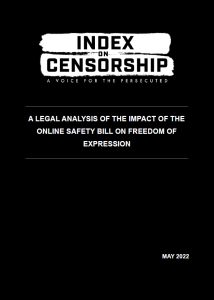 The Online Safety Bill has simple, laudable aims – to make the online sphere more safe. But despite almost seven years of debate, thousands of hours of Parliamentary scrutiny, analysis from civil society, business and the media, there is still significant uncertainty about how the Bill will work in practice. The Government is still not able to define terms at the heart of the legislation such as “legal but harmful” or give the as many as 180,000 technology companies big and small who will implement this new legal framework clear guidance on how this landmark legislation should operate.
The Online Safety Bill has simple, laudable aims – to make the online sphere more safe. But despite almost seven years of debate, thousands of hours of Parliamentary scrutiny, analysis from civil society, business and the media, there is still significant uncertainty about how the Bill will work in practice. The Government is still not able to define terms at the heart of the legislation such as “legal but harmful” or give the as many as 180,000 technology companies big and small who will implement this new legal framework clear guidance on how this landmark legislation should operate.
To fill this gap and help explain what the Bill will mean in practice, the Legal to Say Legal to Type campaign has instructed media law expert Gavin Millar QC of Matrix Chambers to produce the first analysis of the implications of the Online Safety Bill on UK citizens’ freedom of speech.
The QC’s opinion explains and analyses the broad implications of the Government’s new online safety regime against current freedom of expression laws and found that the Bill will significantly curtail freedom of expression in a way that has profound consequences for the British media and journalism, courts and the UK’s digital economy. The Bill gives the Secretary of State overseeing the legislation unprecedented powers to curtail freedom of expression with limited parliamentary scrutiny.
The Bill, which received a second reading in Parliament on 19 April, does not comply with Article 10 of the European Convention on Human Rights, and far from the claim of the Culture Secretary that the Bill will protect free speech it actively undermines existing legal protections in an unprecedented manner. This new analysis shows how the Online Safety Bill as currently drafted ends the historic principle in law that people can publish what they like, unless the state specifically and clearly passes laws to the contrary.
This report is not a comprehensive dissection of the flaws in the Bill which are too vast to deal with succinctly. For example, the UK Independent Reviewer of Terrorism Legislation, Jonathan Hall QC has recently publicly criticised the Bill as being “ineffective on terrorism”. The chief criticism he lays is that “the Bill defines ‘terrorism content’ by reference to terrorism legislation, but ignores intention and defences. This leads to some very odd outcomes. It’s hard to see how it provides a workable framework for regulation.”
The ambiguity of the drafting and the lack of governmental consideration on the Bill’s intersection with existing linked areas of law is indeed staggering. The idea that speech can be lawfully moderated without properly adjudicating on an individual’s intention and the context of the speech is nonsensical – irrespective of whether your concern is terrorism, crime or freedom of expression.
Index on Censorship believes that the consequences of the Bill (intended and unintended) go beyond what has been considered in Parliament to date, for example:
- The Bill violates freedom of speech as defined in UK and international law.
- Protections for media content are not as wide as existing human rights for journalists
- Pro-active state-enforced censorship by algorithm has questionable legality.
- New powers for platforms such as Meta, Twitter, and even companies like Apple, will mean they may be performing functions of a public nature under the “Duty of Care” and could be subject to judicial review.
- The Secretary of State for Digital, Culture, Media and Sport will have an unparalleled ability to censor.
- The proposal to proactively monitor private communications lack safeguards for journalistic or legally privileged material.
The Government has ended up in this position having disregarded all the learnings from regulation of the online space over the last twenty years, including some of the fundamental building blocks of the internet namely intermediate liability protections. This is despite pre-legislative scrutiny identifying flaws in the draft Bill.
In summary, the legal advice, published in full in this report, found:
- The regime proposed by the Bill does not contain the statutory safeguards that would be required to prevent or limit the risk of violations of the right to freedom of expression.
- The structure of regulation offers no prospect of ‘fact-specific’ adjudications on speech.
- Harmful speech has no legal basis and risks restrictions on speech that are too broad and therefore open to abuse through selective enforcement.
- On the face of the Bill there appears to be a risk that platforms, and possibly Ofcom, may access confidential journalistic material in carrying out their statutory functions.
- ‘Democratic importance’ protections are not as wide as existing human rights protections as they only cover a limited form of political expression.
The report is available to read in full below or to download here.
Attacks on journalists covering protests increase says new report
Physical attacks on journalists have increased dramatically over the past year, according to the latest annual report from the Council of Europe Platform on media freedom in Europe.
The platform, of which Index on Censorship is a partner, reports on serious threats to the safety of journalists and media freedom in Europe in order to reinforce the Council of Europe’s response to the threats and member states’ accountability.
The new report, Defending Press Freedom in Times of Tension and Conflict, reveals that the number of cases involving the safety and physical integrity of journalists has jumped by 51% year-on-year, with 82 cases reported to the platform.
Many of the attacks on journalists have taken place during public protests.
“Violence against journalists during street protests is fed by a wave of media bashing and an avalanche of hate speech on social networks – very often prompted by political figures – which directly target journalists, questioning their independence and legitimacy and therefore making them more vulnerable to physical aggression,” the report says.
Overall, the number of alerts in all categories published by the CoE platform has sky-rocketed to 280 in 2021, up from around 200 in 2020 and more than double the level reported in 2016. Of the 280 alerts, 110 related to the harassment and intimidation of journalists.
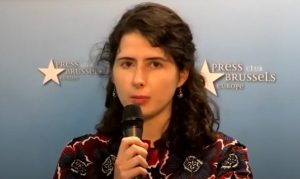
Index’s policy and campaigns manager Jessica Ní Mhainín
Speaking at the launch of the report, Index’s policy and campaigns manager Jessica Ní Mhainín highlighted cases of impunity in CoE’s report.
“Impunity for crimes against journalists refer to failure of states to identify, prosecute and punish anyone including the assailants and masterminds involved in committing a crime against a journalist,” she said. “Cultures of impunity contribute to self-censorship by making journalists more vulnerable to pressures out of fear of reprisals or harm.”
Some 35 cases of impunity have been registered on the platform since 2015 and two new impunity cases – those of Turkish journalist Uğur Mumcu, murdered in 1993, and Turkish-Cypriot journalist Kutlu Adalı, murdered in Cyprus in 1996 – were added to the impunity category during the year.
“In 2021, we welcomed the Slovak Supreme Court’s decision to overturn the not-guilty verdicts of the suspected masterminds of the 2018 murder of journalist Ján Kuciak and his fiancée Martina Kušnírová. The case will be heard in the Specialized Criminal Court later this year,” said Ní Mhainín.
Last year also saw the publication of a 438 page-report from the public inquiry into the assassination of investigative journalist Daphne Caruana Galizia, which concluded that the state of Malta “must bear responsibility for the assassination because it created an atmosphere of impunity”.
“We once again call on the Maltese authorities and the Commission of Experts to implement the recommendations of the Public Inquiry,” said Ní Mhainín.
Russia, Turkey and Ukraine account for 60% of all the cases relating to impunity on the platform. Last October marked the 15th anniversary of Russian journalist Anna Politkovskaya’s murder.
Ní Mhainín said, “The masterminds of her murder are still at large, sending the incredibly dangerous message that killing a journalist is a low-risk crime.”
Yet impunity is not restricted to these countries.
A BBC Spotlight investigation has uncovered serious concerns over the police investigation and the failure to prosecute those behind the murder of Irish journalist Martin O’Hagan, who was killed in September 2001 for his reporting on paramilitary activities in Northern Ireland. The concerns raised in the programme, which aired on 2 March 2022, came in the wake of several Police Ombudsman reports that uncovered collusive behaviour between the police and loyalists in Northern Ireland. According to the BBC’s investigation, police did not act on important information – including individual names – that were handed over to them within 48 hours of the murder. The journalist’s family are now taking legal action against the Police Service of Northern Ireland (PSNI) and the Ministry of Defence.
“Press freedom is the canary in the coal mine – it is a key indicator of the clear and worrying degree of democratic backsliding that is taking place across Europe,” said Ní Mhainín. “That’s why we once again call on Council of Europe member states to ensure that the highest priority is given to conducting thorough and transparent investigations into all crimes against journalists and we remind member states of the 2016 Recommendation of the Committee of Ministers which requires states ‘adopt appropriate criminal law provisions to prevent impunity’”
Elon Musk’s acquisition of Twitter – good for free speech?
On 25 April, Twitter announced that it has entered into a definitive agreement to be acquired by an entity wholly owned by tech entrepreneur Elon Musk in a transaction valued at approximately US$44 billion. He had previously announced that he had amassed a 9% stake in the social media platform.
Ooh, that’s a lot of money.
Elon Musk is not short of a few dollars. He made $175 million from selling his stake in PayPal when it was sold to eBay. He was an early investor in electric vehicle manufacturer Tesla, of which he is now CEO, and he founded rocket company SpaceX. His net worth is estimated at US$264.4 billion, making him the richest person in the world.
Why has he bought Twitter?
Musk is one of Twitter’s biggest users, with 86.2 million followers. He has hinted that he might want to buy it for several years. That said, he has had a love-hate relationship with the platform. In 2018, he suggested on Twitter that he had enough funding to take Tesla private but was subsequently fined $20 million as it had affected the market in Tesla shares, something frowned upon by the US Securities and Exchange Commission.
Why is everyone talking about free speech?
Elon Musk clearly wants Twitter to reconsider its approach to free speech. In the press release on the acquisition, Musk’s only statement was: “Free speech is the bedrock of a functioning democracy, and Twitter is the digital town square where matters vital to the future of humanity are debated. I also want to make Twitter better than ever by enhancing the product with new features, making the algorithms open source to increase trust, defeating the spam bots, and authenticating all humans.”
What does Elon Musk think free speech is?
Elon Musk describes himself as a “free speech absolutist”, posting that he would not remove access to Russian news sources through his satellite internet company Starlink “except at gunpoint”.
Clarifying his position on Tuesday evening, Musk tweeted, “By “free speech”, I simply mean that which matches the law. I am against censorship that goes far beyond the law. If people want less free speech, they will ask government to pass laws to that effect. Therefore, going beyond the law is contrary to the will of the people.”
What about the freedom to criticise him and his companies?
He clearly does not want everyone to have free speech, most notably disgruntled Tesla employees and whistleblowers.
Isn’t Twitter quite hot on free expression anyway?
Twitter says in its policy on freedom of expression that “defending and respecting the user’s voice is one of our core values” and that this commitment is based on the the United States Bill of Rights and the European Convention on Human Rights, as well as being informed by a number of additional sources including the members of its Trust and Safety Council, relationships with advocates and activists around the globe, and by works such as United Nations Principles on Business and Human Rights.
In its policy on hateful conduct, Twitter says, “Free expression is a human right – we believe that everyone has a voice, and the right to use it. Our role is to serve the public conversation, which requires representation of a diverse range of perspectives.
We recognize that if people experience abuse on Twitter, it can jeopardize their ability to express themselves… For this reason, we prohibit behavior that targets individuals or groups with abuse based on their perceived membership in a protected category.”
What’s this he’s saying about authenticating humans? Sounds a bit weird.
It seems clear that while Musk is keen to allow “lawful” free speech, he is less keen on the ability for people to remain anonymous on the platform.
In its transparency report, Twitter says that “anonymous and pseudonymous speech is important to Twitter”.
Anonymity is particularly valuable for dissidents and for others who fear attack if they reveal their true identity.
Some of the world’s most authoritarian regimes want social media users to have to identify themselves. That should raise a red flag.
Will Musk’s acquisition see Twitter veer to the right?
Musk has been hard to pin down on his political views, with most seeing him as a social libertarian.
One of the criticisms often aimed at Twitter is that it and its staff are too woke.
However, Twitter’s own research shows that mainstream right-wing parties benefit at least as much, and often substantially more, from algorithmic personalisation as their left-wing counterparts.
It also found that content from US media outlets with a strong right-leaning bias are amplified marginally more than content from left-leaning sources.
The million-dollar question: Will Musk ask Twitter to reinstate Donald Trump’s Twitter account?
On 8 January 2021, Twitter announced that it would permanently ban former President Donald Trump from Twitter “due to the risk of further incitement of violence” following the storming of the US Capitol by his supporters.
Musk might try as part of his commitment to free speech to allow Trump back on but Trump himself says he won’t rejoin even though his own Truth Social platform appears to be struggling to make an impact.
And finally, will Musk’s acquisition give China greater influence over Twitter?
Musk’s fellow rocket-loving gazillionaire Jeff Bezos jumped on Twitter to ask whether Musk’s acquisition of Twitter would give the Chinese government “a bit of leverage over the town square?”.
The Amazon founder asked the question in response to another tweet by New York Times reporter Mike Forysthe that pointed out that China was Tesla’s second biggest market after the USA in 2021 and that Chinese battery makers are major suppliers for Tesla’s electric vehicles.
Bezos answered his own question, saying “probably not” and that a “more likely outcome…is complexity in China for Tesla, rather than censorship at Twitter”.
Thousands of Twitter users helpfully pointed out to Bezos that people could ask the same question of him following his acquisition of the Washington Post in 2013. User Sankrant Sanu wrote: “How much leverage does China have over Washington Post given the percentage of goods sold on Amazon that are dependent on that country for supply?

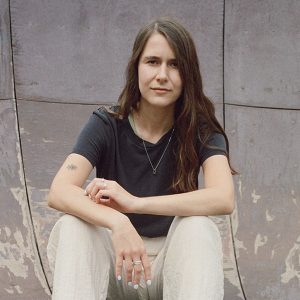 Sonya Groysman is a Russian journalist and podcaster. Despite being labelled as a ‘foreign agent’ by Russian authorities she has continued to report on human rights issues and censorship in Russia.
Sonya Groysman is a Russian journalist and podcaster. Despite being labelled as a ‘foreign agent’ by Russian authorities she has continued to report on human rights issues and censorship in Russia.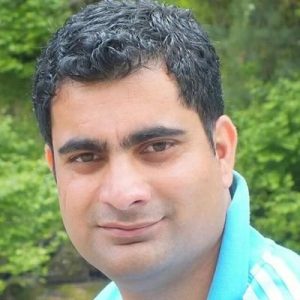 Bilal Hussain is a journalist based in Srinagar in Kashmir. He focuses his reporting on freedom of expression issues.
Bilal Hussain is a journalist based in Srinagar in Kashmir. He focuses his reporting on freedom of expression issues. Huang Xueqin is an activist and journalist who has worked with several domestic Chinese media outlets. She has reported extensively on the MeToo movement in China.
Huang Xueqin is an activist and journalist who has worked with several domestic Chinese media outlets. She has reported extensively on the MeToo movement in China.